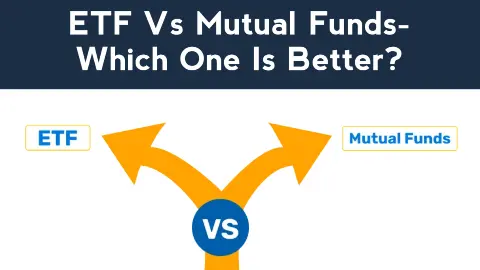Exchange-traded funds (ETFs) and mutual funds are vehicles for accessing underlying investments. Some call ETFs the new kid on the block. Critics point out all the things ETFs do not do well and how mutual funds are much better. Untangling the confusion is a matter of understanding the differences and when each structure is most appropriate.
Let us start by knowing what ETFs and Mutual funds are.
What Is An Exchange-traded Fund or ETF?
An investment fund traded on a stock exchange. Securities in an ETF include stocks, commodities, and bonds, which trade for an amount close to the original total asset value during the trading day.
ETF price moves up and down throughout the day. They have much lower fees and higher daily liquidity than mutual fund shares.
ETF shares are traded on public stock exchanges. So, they can be easily transferred, purchased, or sold like stock shares. These are managed through creation and redemption processes involving investors called authorized participants (APs). APs are often major financial institutions like banks and investment firms with significant buying power.
What Is A Mutual Fund?
It is an investment that pools money from many investors and invests in securities like money market instruments. These are managed by professionals to seek capital or income for investors.
Mutual funds give each shareholder access to professionally managed portfolios of equities, bonds, and other securities. Its performance is usually measured by the change in net market cap derived from the aggregated performance of underlying investments.
What Are The Differences Between ETFs and Mutual Funds?
Here are some important differences between Exchange-Traded Funds and Mutual Funds.
Passive or Active Management
In Mutual Funds, both are available, but they are primarily passive. In ETFs, both are available but are active.
Operating Expenses
ETFs have lower operating expenses than mutual funds, and mutual funds have variable operating expenses.
Differences Based On Trading
Mutual Funds are bought and sold at the total asset on closing date. Whereas, exchange-traded funds are traded throughout the trading daytime and fluctuate in value throughout that period.
Beneficial To Tax
Mutual Funds are more tax beneficial than ETFs. ETFs offer tax benefits to investors because of their creation and redemption processes.
Involvement Of Transaction Costs
Typically, the transaction costs are free when you buy or sell mutual fund shares. With ETFs, you will incur an additional expense known as the bid-ask spread.
Buying And Selling Of Securities
Mutual Fund shares are available only directly from the funds at the NAV price (same price throughout the trading day). ETFs are available for buying and selling anytime on the stock exchange at the market price.
Requirement Of Minimum Investment
Most Mutual Funds have a specified minimum expense. For ETFs, there is no specification of minimum investment.
Minimum Holding Period
Some mutual funds charge a penalty if you sell shares too soon. Generally, you are limited to selling within 90 days of purchase. ETFs don’t have any time limit on selling assets. You can buy or sell at any trading day’s price, so there’s no minimum holding period.
Difference In Terms Of Liquidity
Mutual funds are less liquid than ETFs. ETFs have much higher liquidity because they are not correlated to daily trading volume. ETF liquidity depends on the liquidity of the stocks in the index.
What Are The Similarities Between ETFs and Mutual Funds?
Here are some important similarities between these two investments:
- Both of these funds are a basket of securities. The investors buy these securities with money pooled together from each savings.
- Mutual funds and ETFs can be actively or passively managed, but most exchange-traded funds are passively managed to track an index.
- ETFs and mutual funds allow investors to access different asset classes, including stocks, bonds, commodities, cash-equivalent securities, or any combination thereof.
ETF vs Mutual Funds: Which One Is Better?
If you want to build a diversified portfolio, both are good options for investment. But, as mentioned above, you can decide which is better based on the time frame, risk appetite, and financial goals.
For some investors, liquid investments were taken over long-term ones. Both funds are similar and offer a diversified portfolio, but a proper combination of ETFs and mutual funds can improve your track record.
Before acting, understand how both funds work and how much market risk you are willing to take, and consult a professional to make the right investment decision for yourself. Invest more, but invest wisely!
The Bottom Line
ETFs are similar to mutual funds, but they also have some differences. ETFs usually have lower fees and trade intraday-like stocks. Both mutual funds and ETFs appeal to less risk-tolerant investors, but they also carry market risks that investors should consider before investing.
Have more questions about stock exchange operations? Click here to contact us. Do not forget to share this article with your friends who want to invest in these securities.



